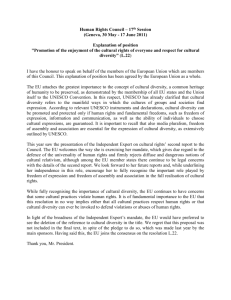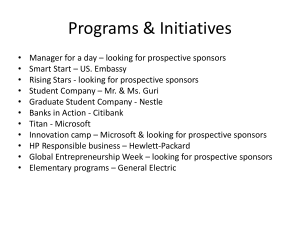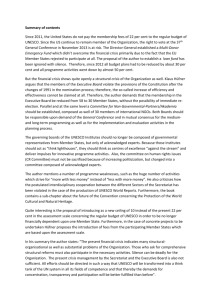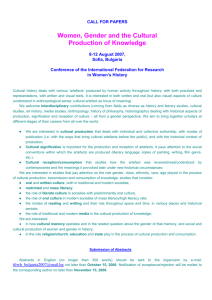The information solicited through this
advertisement
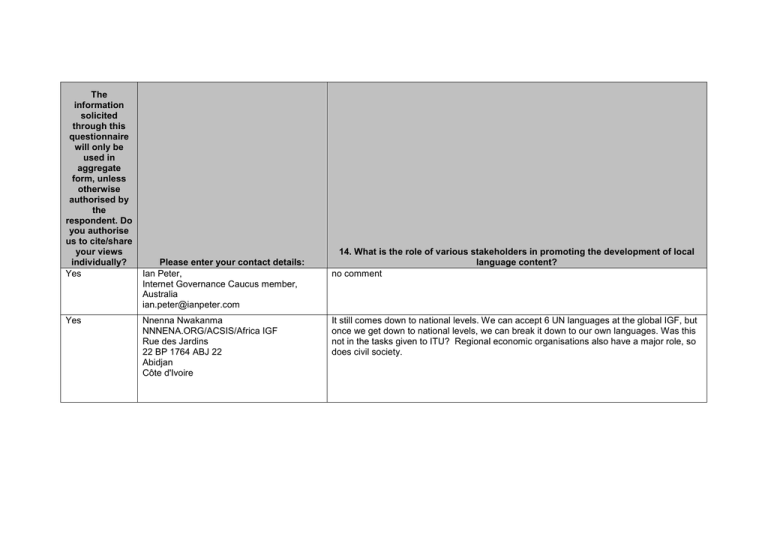
The information solicited through this questionnaire will only be used in aggregate form, unless otherwise authorised by the respondent. Do you authorise us to cite/share your views individually? Yes Yes Please enter your contact details: Ian Peter, Internet Governance Caucus member, Australia ian.peter@ianpeter.com Nnenna Nwakanma NNNENA.ORG/ACSIS/Africa IGF Rue des Jardins 22 BP 1764 ABJ 22 Abidjan Côte d'Ivoire 14. What is the role of various stakeholders in promoting the development of local language content? no comment It still comes down to national levels. We can accept 6 UN languages at the global IGF, but once we get down to national levels, we can break it down to our own languages. Was this not in the tasks given to ITU? Regional economic organisations also have a major role, so does civil society. Yes Country: DEMOCRATIC REPUBLIC OF CONGO It is a cultural issue and it depends on the national policy for promoting national languages. Organization: CENTRE AFRICAIN D'ECHANGE CULTUREL Adress: CAMPUS NUMERIQUE FRANCOPHONE DE KINSHASA.44, AVENUE DE L'HOPITAL email: cafec3m@yahoo.fr/b.schombe@gmail.com Yes Russia, Coordination Center for Russian Top-Level Domains, 8, Zoologicheskaya Str., Moscow, 123242, Russia; info@cctld.ru From the public policy perspective, clearly, it is Governments that have an upper hand as far as local-language content, and to this effect they should promote public e-initiatives, including, but not limited to, e-education, e-government, etc. which should become drivers for localized content development in a given country. As to other stakeholders, they can only play their complementary respective roles, provided Governments enable their contribution through a sound legal framework. Yes Sweden, Netnod, Franzéngatan 5, 112 51 Stockholm, info@netnod.se To within the power of each stakeholder group to REMOVE obstacles related to creation, distribution and access to content, and ENABLE/SUPPORT it. Yes Bangladesh The Forum for Development, Journalism and Communication Studies (FOCUS) focus_bangladesh@yahoo.com National governemnt must commission local experts and can take assistance from othercountries. Yes Russia Russian Association for Electronic Communications Presnenskaya embankment, 12, Federation Tower West, floor 46, Moscow, 123100 www.raec.ru info@raec.ru From the public policy perspective, clearly, it is Governments that have an upper hand as far as local-language content, and to this effect they should promote public e-initiatives, including, but not limited to, e-education, e-government, etc. which should become drivers for localized content development in a given country. As to other stakeholders, they can only play their complementary respective roles, provided Governments enable their contribution through a sound legal framework. Yes Country: United States Organization: Internet Governance Project Address: Syracuse University School of Information Studies Syracuse, NY 13244 USA E-mail: press@internetgovernance.org This is an important question but we find it to be outside the scope of the Enhanced Cooperation working group and thus we choose not to answer it here. Yes Internet Corporation for Assigned Names and Numbers Los Angeles, CA, USA 12025 Waterfront Drive, Suite 300 Los Angeles, CA 90094-2536 USA Phone: +1 310 301 5800 FAX: +1 310 823 8649 baher.esmat@icann.org Development of local content is a clear example of enhanced cooperation, as many stakeholders have a role to play in this area. Stakeholders, from policy makers, industry, technical community, academia and end-users, have been engaging in numerous efforts and initiatives around the world to promote the development and use of local content. As evidenced by the study [4] of UNESCO, OECD, and ISOC, on local content and access prices, which in itself is a good example of enhanced cooperation, the development of local content is key in promoting the participation of stakeholders from developing economies and other marginalized groups. [4]: http://www.unesco.org/new/fileadmin/MULTIMEDIA/HQ/CI/CI/pdf/local_content_study.pdf South-South Opportunity jrtnchekoua@gmail.com B.P 33 Yaoundé Cameroon" Policy: Culture, books, internet. The first digital resources acquired national license are now available to public libraries. Under the draft Digital Science Library and Investment for the future, the Ministry of Higher Education and Research started in 2010 to develop national license in a number of digital resources (Early English Books Online, corpus Classiques Garnier digital dictionaries, corpus of journals and e-books published by Springer, etc.). USA This space intentionally left blank Yes Yes American Registry for Internet Numbers (ARIN) 3635 Concorde Parkway, Suite 200 Chantilly, Virginia, 20151 chandley@arin.net Yes Country: JAPAN Organization: Japan Network Information Center (JPNIC) Address: 4F Urbannet Kanda bldg. 3-6-2 Uchi-Kanda, Chiyoda-ku Tokyo 101-0047 JAPAN Email: secretariat@nic.ad.jp (Left intentionally blank) Yes Country:Japan Organization:KEIDANREN Address:1-3-2,OTEMACHI CHIYODAKU,TOKYO 100-8188 E-mail:joho@keidanren.or.jp Governments are responsible in developing environments to foster local content by promoting Internet literacy education. Industry will work in distributing high-value local content and to develop fair markets in digital content while collaborating with governments to prevent piracy and counterfeiting. In addition, citizens and Internet users need to cooperate and actively participate in developing and using local content. Yes Yes Yes Country: Japan Organization: Japan Registry Services Co., Ltd. Address: CFB East 13F, 3-8-1 NishiKanda, Chiyoda-ku, Tokyo 101-0065 JAPAN E-mail: hotta@jprs.co.jp Government Offices of Sweden Ministry for Foreign Affairs Department for International Law, Human Rights and Treaty Law Carl Fredrik Wettermark SE-103 39 Stockholm Sweden carl-fredrik.wettermark@gov.se . United States, Imagining the Internet, CB 2850, Elon University, 27244, andersj@elon.edu no time There is a virtuous circle where infrastructure development, growth of local content and lower access prices, feed each other. Market demand for local language content is driven by improved access, faster networks (for example, through the establishment of national Internet exchange points) and political support for broad, inclusive use of ICTs in the general public. Stakeholder groups should be aware of the “content divide” where much of the world’s content is unavailable to local population. Each stakeholder group can act in their sphere in support to the development of local content; OECD has suggestions for how this can be done (http://www.oecd.org/sti/ieconomy/50305352.pdf). Yes Igor Milashevskiy, i.milashevskiy@minsvyaz.ru Alexander Grishchenko, a.grichenko@minsvyaz.ru Governments, and international, regional and other widely recognized organizations, businesses, civil society should take part in improvement of access to national knowledge and support development of content in national languages. Russian Federation Ministry of Telecom and Mass Communications (Mincomsvyaz of Russia) 7, Tverskaya str., Moscow, 125375, Russian Federation Email: office@minsvy Yes RIPE NCC Singel 258 1016AB Amsterdam The Netherlands Email: externalrelations@ripe.net - Yes Ellen Blackler Vice President, Global Public Policy The Walt Disney Company 425 Third Street, Suite 1100 Washington DC 20024 United States Around the world we have seen that locally relevant content plays a critical role in the growth of the Information Society and we encourage greater focus on how its creation can be encouraged. The 2011 study by UNESCO/OECD/ISOC entitled ”the Relationship Between Local Content, Internet Development and Access Prices,” established a strong link between the availability of local content, adequate infrastructure and access prices identifying a virtuous cycle between the three. That study supported what we have seen over and over – users will adopt broadband when they can access content they find relevant. The benefits of this virtuous cycle will be maximized by taking a broad view of local content that includes all content local audiences find meaningful to their lives and interests and relevant to the communities they view themselves belonging to. The promotion of local content can be best achieved by understanding the factors that create an environment encouraging its creation including: •Investment in technology necessary to reach users (e.g., infrastructure, both last mile, transport, local IXP and local caching and hosting capabilities). Governments can encourage this investment with polices of liberalized markets, encouraging private sector competition and avoiding over-regulation as well as encouraging development of local IXPs, caching and hosting capabilities. •An environment that supports expression for both creative and political speech, including protections against harassment and abuse based on the views expressed. Governments, private sector stakeholders and NGOs can support policies that support expression rights. Such policies should also recognize the right to expression is not absolute. There are long standing legitimate limitations to expression where it interferes with the rights of others and consistent with international standards. •Development of an e-commerce infrastructure based on trust. This includes privacy protections for creators and users, consumer protection infrastructure, developed payment platforms and intellectual property protection so that creators can monetize content if they wish. Governments, private sector stakeholders and NGOs can work to insure interoperable consumer protection, banking and privacy laws are in place that will promote commerce not stymie it. Similarly protection of intellectual property through strong laws and effective enforcement will encourage the kind of locally relevant content that will drive adoption. •Improved digital literacy and ITC skills so that content creators can create and distribute content online Yes Mark Carvell Head, Global Internet Governance Policy Creative Economy, Internet and International Department for Culture, Media & Sport 100 Parliament Street London SW1A 2BQ United Kingdom mark.carvell@culture.gsi.gov.uk The public-private partners and government donors who facilitate the roll out of Internet exchange points have a major contribution to make to fostering local language content. Likewise ICANN, in partnership with UNESCO, relevant governments and industry experts, as it progressively introduces non-Latin scripts into the top level of the domain name system. There is more progress to be achieved and the benefits for communities and cultural heritage are significant in the age of the knowledge economy. Information exchange and dialogue at the regional and global IGFs about the possible barriers for the development of content (financial etc) would be very beneficial. Yes ORGANISATIONAL ENDORSEMENTS: Not answered. Association for Progressive Communications (APC) Global Valeria Betancourt <valeriab@apc.org> Bytes for All, Pakistan Pakistan Shahzad Ahmad <shahzad@bytesforall.pk> Centre for Community Informatics Research. Development an Yes Malaysia Consumers International Lot 5-1 Wisma WIM, Jalan Wan Kadir 3, Taman Tun Dr Ismail, WP 60000, Malaysia jeremy@ciroap.org We associate ourselves with the Best Bits submission, except for the additional answer to question 8 above. Yes Country: Switzerland Organization: Digitale Gesellschaft Schweiz Address: Digitale Gesellschaft, c/o Swiss Privacy Foundation, CH-5620 Bremgarten AG E-mail: office (at) digitale-gesellschaft.ch (no answer) Yes (a young international NGO with seat in Switzerland) Organization: GodlyGlobal.org Address: GodlyGlobal.org c/o Norbert Bollow, Weidlistrasse 18, CH-8624 Grüt Email: nb@GodlyGlobal.org We do not have expertise to comment on this question beyond the obvious observation that every stakeholder should of course work towards ensuring that all of their content is available in as many languages as reasonably possible. Yes Anja Kovacs, Project Director Internet Democracy Project C14E Munirka DDA Flats New Delhi 110067 India (Not answered) anja@internetdemocracy.in Yes Yes Country: India Organization: SFLC.IN Address: 2nd Floor, K-9, Birbal Road, Jangpura Extension, New Delhi -110 014, India. E-mail : mishi@softwarefreedom.org LACNIC Latin American and Caribbean Regional Addresses Registry Rambla República de México 6215, Montevideo, Uruguay. comunicaciones@lacnic.net In para 53 of the Tunis agenda commits to working earnestly towards multilingualization of the Internet, whereby it also supports the local content development, translation and adaptation, digital archives, and diverse forms of digital and traditional media. Multi stakeholders are now launching flagship partnership and advocacy Initiatives aimed at accelerating connectivity and access. The same has been cited in of statement of the Secretary General on “Progress made in the implementation of and follow-up to the outcomes of the World Summit on the Information Society at the regional and international levels” on March 2009. All stakeholders including private sector, civil society, inter-governmental organisations and international organisations have a role to play in promoting the development of local language content. ICANN has a dedicated group working on local content development. The steps taken by ICANN to register domain in non-latin script in 2008 was an important milestone. UNESCO with various programmes like Local Content for Development through ICTs, UNESCO Programme for Creative Content, Public Service Broadcasting and Community Multimedia Centres have helped in this regard. The free software and Wikimedia communities have been in the forefront of developing applications and content in local languages. The Governments should enlist the participation of all these agencies and should have co-ordinated programmes for development of applications and content in local languages. There are many aspects related local development of networks: Keeping local traffic local, hosting local or regional content in the same region, and promoting local language content. Many stakeholders have been committed with different aspects of local and regional development of the network, such as the establishment of Internet Exchange Points. LACNIC promoted since the beginning of its existence the IXPs thought its Napla program. Governments of the LAC region are also aware of the need for promoting IXPs. Regarding local content, also the public sector of developing countries is aware of the importance of avoiding their local traffic to connect overseas, especially when that traffic is trying to find local content and some public private partnership shall be implemented. Regarding local languages content, this element has little connection with the development of the Internet, being more related to cultural matters. Governments and Civil Society might evaluate this issue. Yes United States Center for Democracy & Technology 1634 I Street NW #1100 Washington, DC 20006 mshears@cdt.org Yes Yes Not answered Not answered. Brazil _ Center for Technology and Society of Fundação Getulio Vargas Praia de Botafogo, 190, 13 andar Rio de Janeiro - RJ joana.varon@fgv.br marilia.maciel@fgv.br Yes Japan, Ministry of Internal Affairs and Communications Kasumigaseki 2-1-2, Chiyoda-ku, Tokyo 100-8926, JAPAN m3.ichikawa@soumu.go.jp With the spread of social media, it can be said that local language contents have been increasing. As a result, we think that various stakeholders should contribute to the securement of Internet access and improvements in media literacy so that people can utilize these applications at affordable prices. Yes Cote d’Ivoire, DIGILEXIS – SPR, 28 BP 1485 Abidjan 28 kichango@gmail.com (Not answered.) Yes France, INTLNET, 120 chemin des Crouzettes, Saint-Vincent de Barbeyrargues, France 34730, info@intlnet.org Languages, first of all, are interbrain protocols. Up to now, these protocols were used between HSS-NSPs (Homo Sapiens Sapiens versions of Natural Semantic Processors). They are progressively also being used by evolutive DAB-ASP (Digital Algorithmic Bots versions of Artificial Semantic Processors). As such, they become "mecalanguages". The question that needs answering, therefore, is who is going to lead the linguistic evolution: people or semantic processor designers, developers, and their sponsors? When one considers the attention paid by IETF dominants to the Unicode consortium (not to the tables), Raymond Kurzweil’s current job description which is "to bring natural language understanding to Google", and what I had to fight for at the IETF to protect languages and cultures from protocol limitations, the priority is to claim for a Linguistic Exception as an extension of the WTO French required Cultural Exception. Yes Saudi Arabia, Communications and Information Technology Commission (CITC) PO Box 75606, Riyadh 11588, Saudi Arabia MAJED ALMAZYED, mmazyed@citc.gov.sa This is another issue identified in the response to Q4 under the umbrella of multilingualization. Local language content is a priority for many countries in order to achieve universal inclusion in the digital society. These are the key stakeholders. Government: Develop international public policy to promote the development of local language content. Provide incentives and funding for research and development and for businesses aimed at content development and dissemination. Collaborate with other countries on regional programs. Civil society: Champion the cause. Support and enable widespread access to local language content. The technical community and academia: Research and development related to translation, search engines, multilingual email, and other algorithms to speed, simplify and enable local languages. The private sector: Businesses to provide existing content in new languages, to develop new content pertinent to the language and the culture, and to distribute the content. Yes United States of America A logical starting place on the path to promoting the development of local language content is for in-country initiatives to scan and digitize local content on key historical and educational materials. This is supported by international standards for and expanding inventory of languages. There are also a number of commercial language translation tools becoming available that the potential for translating international content into local content. Where donor and international development agencies undertake application and content development, localization of the application and content should be standard and expanded, rather than relying on broad based use of European languages such as English, German, French, and Spanish. ICANN and the IETF have created the standards and environment for internationalized domain names and international languages to be used on the Internet. All stakeholders can help promote development of the local language content, and indeed many are doing so through both discrete and collaborative educational and assistance programs. Yes United States, Intel, 12 Poet Drive, Matawan NJ, 07747, Mike.s.chartier@intel.com . Yes Kenya ICT Action Network (KICTANet) www.kictanet.or.ke, and the Internet Society (ISOC) Kenya Chapter http://isoc.or.ke/ Local stakeholders should Build capacity on development of local language contents, provide resources, and inform the locals on the need to have their own content. Further, emphasize on the need to have locals write their stories from their own perspectives. Contacts: Mwenda Kivuva (Kivuva@transworldafrica.com) Meshack Emakunat (memakunat@yahoo.com) Grace Githaiga (ggithaiga@hotmail.com (M Yes Switzerland, Federal Office of Communications OFCOM, 44 rue de l’Avenir, CH-2501 Biel/Bienne, Switzerland ir@bakom.admin.ch We associate ourselves to the conclusions elaborated by UNESCO, OECD and ISOC on this issue. Yes Finland, Government and other parties include the multi-stakeholder WSIS working group which acts also as steering committee for the Finnish Internet Forum Mervi.Kultamaa@FORMIN.FI All stakeholders in a language area, even a small one, certainly have a role, based on self-interest, in developing content in their official or main business languages. Small local languages without an official status or business significance are probably a different problem, but even their survival in the Internet age should be a multi-stakeholder effort, lead by governments or interested entities from civil society and academia. Yes France, International Chamber of Commerce (ICC), 38 Cours Albert 1er 75008 Paris, aha@iccwbo.org Many stakeholders, through various standards organizations and industry fora have developed and continue to develop the technical capabilities that allow for development of content on the Internet in most languages as well as the ability to develop internationalized domain names. As for the private sector, we note that many companies are developing programmes to promote local language content on the Web. One example is Arabic Web Days, www.arabicwebdays.com Many stakeholders have the ability and responsibility to promote the development of content in local languages: governments through education and primary schools, the private sector, civil society, the Internet technical community, and academic community through other means. Finally, the adequate and effective protection of intellectual property is critical to promoting local content and indeed cultural diversity. In particular, we feel it is important to note the UNESCO’s extensive efforts to foster the development of local language content. We also feel that the OECD has made important contributions to this space through its project, “The Internet Supporting Local Content Development.” This project, which is poised to enter a second phase, has focused on how the Internet can be leveraged for social and economic benefit. Building on complementary work done by UNESCO and ISOC, it has been examining how the Internet supports the development, storage and dissemination of local content. In particular, the second phase of the project will make an important contribution by examining the Internet and the development of local content in Arabic-speaking countries. Yes Czech Republic, Ministry of Industry and Trade of the Czech Republic, Na Frantisku 32, 110 15 Prague 1, novakovam@mpo.cz Civil society and academia – to create the content Private sector, academia, government – to find solutions how to create the framework Yes Russian Federation, The council of the Federation of the Federal Assembly of the Russian Federation (the Upper Chamber)103426, Moscow, Bolshaya Dmitrovka str., 26 rugattarov@council.gov.ru In my view, the crucial role in generating content on cyber-police in local language plays the level of Internet expansion and its accessibility for active middle class. Of course, the question of what is the content for a certain country does not have a clear answer. Depending on the point of view, it can be referred as the entire volume of information in various forms that exist on the web or the most important terms of knowledge base. Therefore, the role of government is to take measures to encourage the growth of Internet expansion. The role of the legislature is to establish a flexible and sensible legislation for generation web-content, which can suppress its socially dangerous parts, such as child pornography, but would not narrow the space of its forms. The role of citizens is to generate, develop and assist the authorities with regulation of web-content (e.g., guidelines for socially dangerous pages). Yes Mexico 1) Camara Nacional de las Industria Electronica de telecomunicaciones y tecnologias de la informacion (CANIETI) Culiácan No. 71 col. Hipodromo Condesa México D.F. INDAUTOR: Trabajar para lograr un multilingüismo de internet, como parte de un proceso multilateral, transparente y democrático en el que intervengan los gobiernos y todas las partes interesadas, así como apoyar el desarrollo, la traducción y la adaptación del contenido local, los archivos digitales y las diversas formas de medios digitales y tradicionales, a la luz del compromiso asumido en la Agenda de Túnez. 2) Instituto Nacional del Derecho de Autor (INDAUTOR), Puebla #143, Colonia Roma CANIETI: El desarrollo de contenidos y apropiación es responsabilidad de todos, sin embargo el tema de gobierno es básico. E-gobierno como punta de lanza. Yes United States of America, United States Council for International Business (USCIB), 1400 K Street, NW, Suite 905, Washington, DC 20005 bwanner@uscib.org Yes 43 civil society organizations, 10 of them with ECOSOC consultive status, and many more individuals. Organizations supporting the proposal: 1. Action Aid International (ECOSOC status) 2. Bangladesh NGOs Network for Radio and Communication, Bangladesh (EC Many stakeholders, through various standards organizations and industry forums have developed and continue to develop the technical capabilities that allow for development of content on the Internet in most languages as well as the ability to develop internationalized domain names. As for the private sector, we note that many companies are developing programmes to promote local language content on the Web. One example is Arabic Web Days, www.arabicwebdays.com Many stakeholders have the ability and responsibility to promote the development of content in local languages: governments through education and primary schools, the private sector, civil society, the Internet technical community, and academic community through other means. Finally, the adequate and effective protection of intellectual property is critical to promoting local content and indeed cultural diversity. We feel it is important to note UNESCO’s extensive efforts to foster the development of local language content. In addition, the OECD has made important contributions to this space through its project, “The Internet Supporting Local Content Development.” This project, which is poised to enter a second phase, has focused on how the Internet can be leveraged for social and economic benefit. Building on complementary work done by UNESCO and ISOC, it has been examining how the Internet supports the development, storage, and dissemination of local content. In particular, the second phase of the project will make an important contribution by examining the Internet and the development of local content in Arabic-speaking countries. . Yes INDIA, Permanent Mission of India to the United Nations Office 9, RUE DU VALAIS, 1202, GENEVA Mission.india@ties.itu.int No Executive Secretariat - Brazilian Internet Steering Committee - CGI.br Avenida das Nações Unidas, 11.541 - 7th Floor São Paulo - SP - Brazil Postal Code: 04578-000 Phone: +55 11 5509-3541 e-mail: secretaria@cgi.br Yes Brazilian Office of W3C Avenida das Naçõ LATVIA, Ministry of Foreign Affairs, mission.un-gen@mfa.gov.lv Development of local language content is an important element in ensuring overall socioeconomic development. All stakeholders have an important role to play in generation, dissemination and consumption of the local language content. National governments would be responsible for creation of an enabling environment including, development of relevant standards, legal protection and business opportunities. Private sector would be responsible to provide innovative solutions to the challenge. Civil society would play a very important role in supporting and generating community interest towards local language content development. Firstly, it is very important to invest in education and capacity building in order to foster the development of local language content. Also, the stakeholders should build a bridge between their fellow citizens and the Internet Governance issues that are being discussed in other forums, such as the IGF. The partnership with governmental and non-governmental organizations could be a start to develop local language content. Furthermore, promoting seminars, courses and events about the theme should help to engage more citizens on this matter, as well as to produce local language content. In Brazil, for example, the Internet Steering Committee promotes the “Brazilian Internet Forum” (http://forumdainternet.cgi.br/), which has many outputs in Portuguese that may contribute to the Internet Governance discussion. Local language and local content are important elements of digital inclusion. A UNESCO, OECD and ISOC study on the economic aspects of local content creation came to the conclusion that there is a positive correlation between local Internet infrastructure and content development. IAB, IETF, ICANN and individual Internet pioneers have contributed to the development of a multilingual Internet, including Internationalized Domain Names and e-mail protocol supporting non-ASCII characters just to mention two. Governments should create an enabling environment that leads to individual creativity and free flow of information and ideas. Yes BULGARIA, Law and Internet Foundation, bul. Patriarh Evtimii 36, Sofia 1000, Bulgaria info@netlaw.bg Developing social media platforms, search engines and entertainment portals should promote local language content. - Telecommunication authorities’/Internet service providers role in promoting local language content is quite important. They can for example offer free domains for those who would develop local content websites; -The biggest ICT companies should provide their software tools in local languages, in order to allow local communities to use these tools; -Governments can provide incentive financing for local content. Yes BULGARIA, Department of Administration Modernization, Council of Ministers, 1 Dondukov Blvd.1594 Sofia is.ivanov@government.bg . Yes Country: Bulgaria Organization: Information Technology and eGovernance Directorate, Ministry of Transport, Information Technology and Communications Address: Sofia, 9 Dyakon Ignatii Str. E-mail: hhristov@mtitc.government.bg All stakeholders have a key role in developing and implementing a local language content because only a small part of all informational contend is from public organizations. It is apparent that without relevant content in local languages the usage of the Internet will remain limited. At present most content comes from providers in the developed countries, reflecting languages, lifestyles and concerns that may be alien to the wide consumers of the content. Here is the role of the various national stakeholders linked with the local communities, defined by their location, culture, language, area of interest, having strong cultural, linguistic, religious orcommon interest links to produce original language content, or to localize, customize, culturalize and socialize existing content (keeping IP rights). Local stakeholders should promote and facilitate the use of local language in order to preserve all the local knowledge and wisdom available. The role of member states to adopt appropriate policy and strategies is crucial in this respect. States and their bodies should do this inviting other stakeholders such as the private sector and civil society to participate. The most relevant stakeholders for this purpose are publishers, content providers, translators, ministries of culture, librarians, and sponsors as well. For economic, cultural, public and entertainment purposes, national libraries should be digitalized. The private sector could offer for instance, new technical solutions and systems that boost creation of local language content. Civil society can ensure the training of local communities to use effectively the opportunities provided by the new platforms. From a technical perspective global stakeholders should strive to promote the use of multi language and multi cultural software tools and systems and ability for meaningful translations of all important information to all major languages. In greater detail developing social media platforms, search engines and entertainment portals should promote local language content. The telecommunication authorities’/Internet service providers’ role in promoting local language content is quite important here. They can for example, offer free domains for those who would develop local content websites.The biggest ICT companies should provide their software tools in local languages in order for to allow local communities to use these tools. Yes Bulgaria, Executive Agency Electronic Communication Networks and Information Systems. Bulgaria 1000 “Gurko 6” str. mail@esmis.government.bg Without relevant content in local languages the usage of Internet will remain limited. The most relevant stakeholders for this purpose are publishers, content providers, translators, ministries of culture, librarians, and sponsors as well. For economic, cultural, public and entertainment purposes, national libraries should be digitalized. Ministries of culture must find ways to promote the creation and preservation of cultural heritage. Yes Bulgaria, Council of Ministers, Strategic Development and Coordination Directorate 1 Dondukov Blvd 1594 Sofia y.stoyanov@government.bg, l.kamenova@government.bg Without relevant content in local languages the usage of Internet will remain limited. The most relevant stakeholders for this purpose are publishers, content providers, translators, ministries of culture, librarians, and sponsors as well. For economic, cultural, public and entertainment purposes, national libraries should be digitalized. Ministries of culture must find ways to promote the creation and preservation of cultural heritage. Yes Bulgaria, Bissera Zankova - Media Adviser to the Ministry of Transport, Information Technology and Communications (MTITC) Sofia, 9 Diakon Ignatii Str. bzankova@gmail.com Yes Bulgaria, Academy of Sciences (IMI-BAS and LT-BAS) Sofia 1113, Acad. G. Bonchev Block 8 Director@math.bas.bg, Yoshinov@cc.bas.bg The role of various stakeholders in promoting the development of local language content should be based at least on two very important acts – the UNESCO Recommendation concerning the Promotion and Use of Multilingualism and Universal Access to Cyberspace from 15 October 2003 at http://portal.unesco.org/en/ev.phpURL_ID=17717&URL_DO=DO_TOPIC&URL_SECTION=201.html and Recommendation CM/Rec(2007)16 of the Committee of Ministers to member states on measures to promote the public service value of the Internet https://wcd.coe.int/ViewDoc.jsp?id=1207291. These instruments endorse diversity and multilingualism online and also speak about supporting the creation and dissemination of indigenous languages content. The role of member states to adopt appropriate policy and strategies is crucial in this respect. States and their bodies should do this inviting other stakeholders such as the private sector and civil society to participate. The private sector could offer for instance, new technical solutions and systems that boost creation of local language content. Civil society can ensure the training of local communities to use effectively the opportunities provided by the new platforms. Freedom of expression is the central right through which content diversity can be achieved and local content in particular can be freely created. The media perceived not only as traditional media but as platforms and services and public service media and community media in particular can be valuable stakeholders that help realizing projects and ideas leading to the expansion of the development of local language content. Most content comes from providers in the developed countries, reflecting languages, lifestyles and concerns that are different to the consumers of the content. Here is the role of the various national stakeholders linked with the local communities, defined by their location, culture, language, area of interest, having strong cultural, linguistic, religious or common interest links to produce original language content, or to localize, customize, culturalize and socialize existing content (keeping IP wrights). Yes Bulgaria, Sofia University "St. Kl. Ohridski" Faculty of Mathematics and Informatics 5 James Bouchier Blvd. Sofia 1164, Bulgaria krassen@fmi.uni-sofia.bg Global stakeholders should promote the use of multi language and multi cultural software tools and systems and ability for meaningful translations of all important information to all major languages. Local stakeholders should promote and facilitate the use of local language in order to preserve all the local knowledge and wisdom available. Yes Bulgaria, Ministry of Economy and Energy 8 Slavyanska str., Sofia 1000, Bulgaria ts.tsankova@mee.government.bg All stakeholders have a key role in developing and implementing a local language content because only a small part of all informational contend is from public organizations. Yes Country: Switzerland Organization: Internet Society Address: Galerie Jean-Malbuisson 15 Email: bommelaer@isoc.org Local content is a key enabler of Internet development and economic growth. Societies have a rich heritage and knowledge base that should be recognized, recorded and shared for the benefits of people throughout the world. However, much of the world’s content remains inaccessible even to the local population, not to mention at a broader level. In 2012, the Internet Society, UNESCO and the OECD collaborated on a study about "The Relationship between Local Content, Internet Development and Access Prices”. The research shows that there is a strong correlation between the development of network infrastructure and the growth of local content, and a connection between developed local Internet markets and lower reported prices for international bandwidth (http://www.internetsociety.org/localcontent). Our work in Africa has also demonstrated a clear link between the establishment of local Internet Exchange Points (IXPs) and the growth of local content and higher quality of service for end-users. In a groundbreaking 2012 study of Exchange Points in Nigeria and Kenya (http://www.internetsociety.org/ixpimpact), ISOC was able to demonstrate that deployment of IXPs has improved the overall Internet experience in these two markets, a development that is being replicated in developing countries around the globe. It is also the case, however, that IXPs are successful within a multistakeholder environment that creates a solid community basis for sustainability, technical capacity development, local governance models, and community support. In many cases, IXPs need the buy-in from Internet service providers, academia, civil society and governments, working together, to deploy and sustain local Internet infrastructure. Local Internet infrastructure provides a foundation for local language content, which, in turn, drives further demand for advanced services and local innovation. Yes Division for the Information Society (DI) Ministry of External Relations - Brazil Tel: +55 (61) 2030-6609 - FAX: +55 (61) 2030-6613 All stakeholders, in their respective responsibilities, have important roles to play in that regard. The government, in particular, could act as catalyzer of actions aiming at the development of local language content. However, as in the case of question 12 above, Brazil considers that this issue, notwithstanding its importance, should not be focused by the WGEC in the light of its mandate and time constraints. Particular emphasis on this issue (which, as per the answer to question 4 is one in a list of many other important public policy issues to be addressed) would not lead to a balanced outcome. No Uruguay Agency for e-Government and Information Society Liniers 1324 F4 direccion@agesic.gub.uy Governments should promote local content development and respect for cultural diversity. This will only be possible to be effective from the generation and building of capacities. For their development, plans and policies that combine the efforts of all stakeholders: governments, civil society, academia and business, are needed. Some of the possible measures for this, among others: promoting ICT education and training, establish regulatory and normative frameworks which contemplate this, have mechanisms for financial support.
